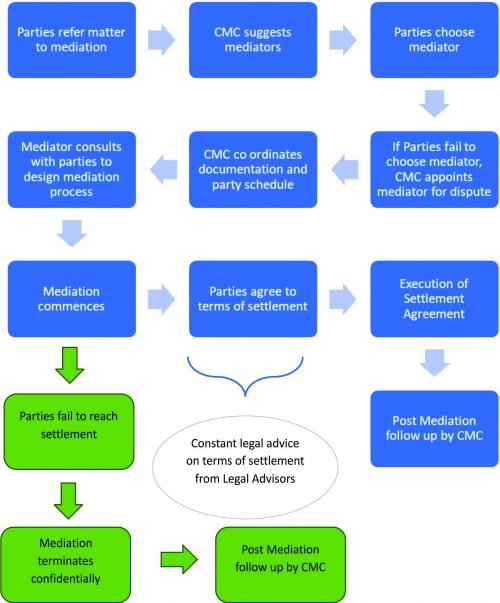Rules And Process
What is Mediation ?
Mediation and conciliation are out of court dispute settlement mechanisms that focus on the commercial interests of the parties rather than what is ‘fair’ and who is ‘wrong’. Mediation is a voluntary and non-binding negotiation process. The outcome of a mediation is a settlement agreement which the parties to mediation execute. Internationally, most mediation settlement agreements are enforced voluntarily without court proceedings because parties decide the terms of settlement and do not sign the agreement till they are convinced they wish to settle the dispute. Such a settlement agreement in a conciliation proceeding is enforceable by law as an arbitration award under Section 74 of Arbitration and Conciliation Act, 1996. United Nations Commission on International Trade Law (UNCITRAL) is in the process of ratifying convention and model law for enforcement of international commercial settlement agreements resulting from mediation. With this convention, international dispute settlements arising from mediation shall be enforceable using a uniform international process prescribed under the convention and model law.
The Centre provides mediation services for all commercial disputes- shareholder disputes, board consensus building, supplier disputes, employment disputes to name a few. The CMC deals with several sectors such as
- Infrastructure, Engineering and Construction, Logistics,
- Banking, Financial Services and Insurance (BFSI),
- Fast Moving Consumer Goods (FMCG),
- Intellectual Property Rights, etc.
Since, CMC has mediators empanelled by the High Court, disputes already being litigated may be referred by judges to the CMC. The terms of settlement may be recorded in the form of consent terms to be presented before the Court which will record the same as a consent decree and make it enforceable like a court decree.
Mediation Rules
All CMC mediations and conciliations are conducted under the CMC rules. Although the process of mediation itself is flexible and customized by mediators as per requirements of dispute and participating parties, the CMC rules attempt to streamline and incorporate the best international practices that have made commercial mediations successful worldwide.
Parties may mutually agree to undertake conciliation?? as per the rules and protocol of CMC. Alternatively, if the parties are unable to agree on a mediator from the list of CMC mediators they may appoint any other mediator as per their choice who is willing to mediate as per CMC mediation rules and at CMC venue. The process shall be confidential as per the rules and protocol of CMC or any other more stringent confidentiality obligations mutually agreed to by the parties. The objective will be to arrive at a settlement agreement that is enforceable.
For more details kindly refer to Mediation and Conciliation rules
Model Clause
Parties can either unilaterally or jointly refer disputes to mediation. However, for those to value risk mitigation, we have designed an ADR clauses for inclusion in contracts.
In case of any dispute arising out of or relating to this Agreement, including the alleged breach, termination, validity, interpretation and performance thereof (“Dispute”), the parties agree first to try in good faith to settle the Dispute by mediation under rules of an institutional mediation service provider such as Centre for Mediation and Conciliation (CMC), Mumbai, before resorting to or during arbitration, litigation, or some other dispute resolution procedure. The Dispute shall be referred to mediation within 30 days of issue of first notice of claims related to the Dispute by either/any party. In the event that parties are unable to agree on a mediator, a mediator shall be appointed by the institutional mediation service provider. The process shall be confidential as per the rules and protocol of institutional mediation service provider or any other more stringent confidentiality obligations mutually agreed to by the parties. Alternatively, the parties may mutually agree to undertake conciliation as per the rules of any institutional mediation service provider, such as the CMC, Mumbai, so that the settlement agreement is enforceable as an arbitration award under Arbitration and Conciliation Act, 1996. Unless otherwise agreed between the Parties mutually and in writing, on the expiry of sixty days from the date of first meeting between the parties with the mediator, the mediation shall stand terminated.
In case the Dispute could not be settled between the parties through mediation, the same shall be settled through arbitration in accordance with the Arbitration and Conciliation Act, 1996 by a sole arbitrator appointed jointly by both Parties. The place of arbitration shall be ________ and the language of the arbitration shall be English. The arbitrator’s award shall be substantiated in writing and the award shall be enforceable in any court having jurisdiction, subject to the laws of India. The award of the arbitrator shall be final and binding on the Parties.
Process
The Centre provides mediation services for all commercial disputes, dealing with issues such as business, real estate, insurance etc. Since CMC has mediators empanelled by the High Court, disputes already being litigated may be referred by judges to mediation at the Centre. The terms of settlement may be recorded in the form of consent terms to be presented before the Court, which will record the same as a consent decree and make it enforceable like a court decree.

Main Mediation Centre High Court Of Judicature at Bombay – Empanelment Letter
Fee Structure
The fee structure of the CMC is based on the commercial value of the dispute. Such fees and administrative charges, shall be proposed by the centre on the basis of the specifics of the dispute.
Please write to us at manager@centre4mediation.com for specific queries.








